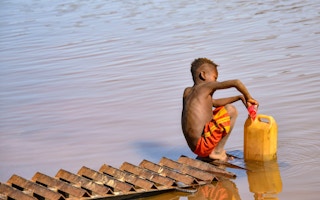Human activities - from destroying forests to burning gas, oil and coal for energy - are disrupting the rainfall the world depends on, fuelling huge economic, health and social stability threats, scientists and economists warned on Friday.
“We’ve built our economies on the assumption we can rely on precipitation,” said Johan Rockström, director of the Potsdam Institute for Climate Impact Research and co-chair of the Global Commission on the Economics of Water, established last May.
But “what we’re finding is climate change and land use change is shifting that very significantly,” he said in an interview ahead of a major UN water summit in New York.
New tools allow scientists to track and quantify flows of water vapour rising from rainforests like the Amazon and falling in distant places such as Argentina’s soybean and wheat fields, which are experiencing worsening drought as the Amazon shrinks.
Vapour originating from the vast plains of Kazakhstan and other parts of Central Asia also provides about half of China’s water, Rockström noted.
But as losses of forests and other nature disrupt those flows - and climate change brings more extreme and unpredictable rainfall on a hotter planet - water security is weakening in much of the world, experts say.
That eroding water security poses a risk to everything from food supplies to hydropower production, a key source of low-carbon energy, the Global Commission on the Economics of Water warned in a report released on Friday.
Severe water scarcity - as seen today in the Horn of Africa after five failed rainy seasons - also has the potential to trigger political instability, conflict, displacement and migration, security analysts warn.
The Global Commission report comes ahead of a key UN water conference next week - the first in five decades - aimed at charting a path to shore up declining global water security.
Today about 2.3 billion people - almost one in three - live in water-stressed countries, a third of those facing critical pressures, according to 2021 data from UN-Water.
Even more - 3.2 billion - live in agricultural areas facing high to very high water scarcity or shortages, the UN Food and Agriculture Organization said in a 2020 report.
“
It’s not enough to store water and allocate water to different users. Now we also need to secure the rainfall so it actually comes each year - so you have to manage your forest and ecosystems in a way that continues to generate water.
Johan Rockström, director, Potsdam Institute for Climate Impact Research








